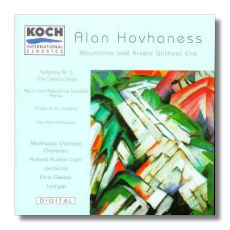
The Internet's Premier Classical Music Source
Related Links
- Hovhaness Reviews
- Latest Reviews
- More Reviews
-
By Composer
-
Collections
DVD & Blu-ray
Books
Concert Reviews
Articles/Interviews
Software
Audio
Search Amazon
Recommended Links
Site News
 CD Review
CD Review
Alan Hovhaness

Orchestral Works
- Mountains and Rivers Without End
- Prayer of St. Gregory
- Aria from Haroutiun
- Symphony #6 "Celestial Gate"
- Return and Rebuild the Desolate Places
Chris Gekker, trumpet
Manhattan Chamber Orchestra/Richard Auldon Clark
Koch 3-7221-2 - 63min
The exotic colors of the Far East, the splendor of mountains, and the ecstatic mysticism of the Armenian church are three themes which have preoccupied Alan Hovhaness consistently for his long and incredibly prolific career. All these elements are splendidly represented here. Mountains and Rivers Without End (written in 1968) is subtitled a "Chamber Symphony". At 25 minutes, it is the longest work in this collection. According to Marvin Rosen's helpful notes, "it was inspired by a Korean landscape painting". Despite this influence, some of the music retains a distinctly Armenian flavor. This symphony begins with a characteristic Hovhaness touch: a downward trombone glissando over pizzicato strings. This glissando will return again and again as the symphony runs its course, though the effect never becomes tiresome. Soon, the winds enter softly, creating a distinctly oriental atmosphere. At 2:13 the bells and the drums produce a gamelan-like ostinato. Over this ostinato, the trombone intones a motif consisting of three short notes followed by two long ones; these long notes are joined by a descending glissando. From this point on, the trombone/gamelan music alternates with the mysterious and vividly colorfsounds of the solo winds in counterpoint, joined occasionally by the harp. The form is rather like a large-scale rondo. A lively and enchanting oriental dance for trumpet and xylophone occurs at 13:14.
The remaining works are quite different in sound and character from the above. Each explores the composer's continuing fascination with the Armenian church. The deeply moving Sixth Symphony (dating from 1959) was further inspired by a painting of Hermon DiGiovanno, who encouraged Hovhaness to examine his ethnic heritage. After a brief introduction by the bassoon with ostinato strings, the clarinet introduces a hypnotic, gently flowing melody of a religious character that calls to mind – but never actually quotes – the Prayer of St. Gregory. This simple, yet endlessly fascinating idea comes to dominate the work. It soon reappears in various guises and colors: oboe, strings, flute, and solo violin. Contrasting with the unearthly beauty of this theme, a dark and restless episode occurs about one-third of the way through, which alternates a Hebraic-sounding melody in the depths of the lower strings with the rushing, freely rhythmic fluttering of the upper strings. The horn and trumpet then present a moving restatement the main theme. A sudden dissonance in the lower strings heralds a dramatic proclamation by the trumpet. Pizzicato strings enter followed by timpani and, eventually, a solo flute. This moment reminds me very strongly of Sibelius – except, that is, for the quirky, Middle Eastern character of the melody and its jazzy syncopations. Strings and trumpet follow with a fresh variation of the familiar clarinet melody, restoring the religious flavor of the work. The symphony concludes gently, with a touching final comment from the strings with flute and harp. I guarantee that this music will haunt you for days.
The playing of the Manhattan Chamber Orchestra is nothing less than spectacular, and Clark clearly has the measure of the elusive Hovhaness idiom. He easily holds together the disparate elements of Mountains and Rivers, without ever losing its pulse or driving energy. Chris Gekker deserves special credit for the beauty and fervor of his trumpet playing, but then so do his colleagues, particularly trombone soloist Thomas Hutchinson for his outstanding work in Mountains and Rivers. The Manhattan Chamber Orchestra is clearly an ensemble of virtuosos, and these pieces give them a golden opportunity to show off their considerable talents. I look forward to hearing further releases from this excellent group – particularly more Hovhaness. Koch's sound is a miracle of transparency and crystal clarity. Each solo instrument is clearly defined, yet never seems artificially enhanced. Bravo!
Copyright © 1996, Thomas Godell


















